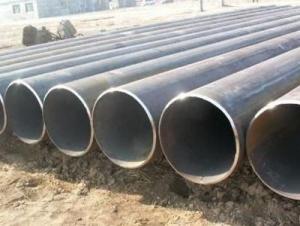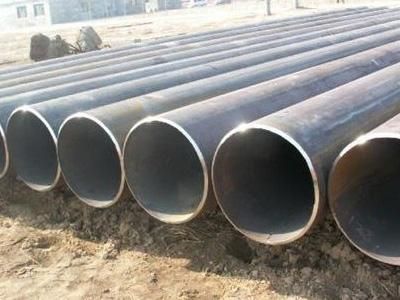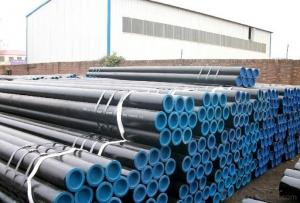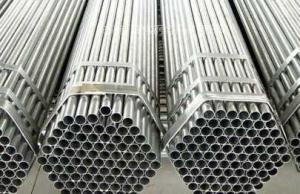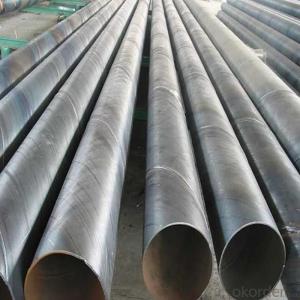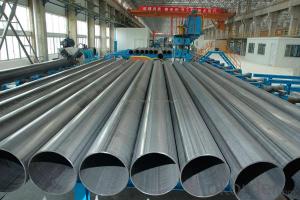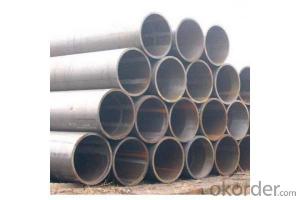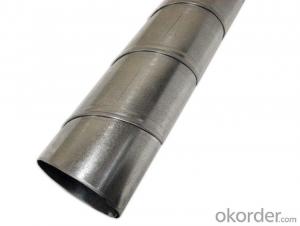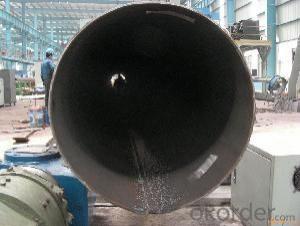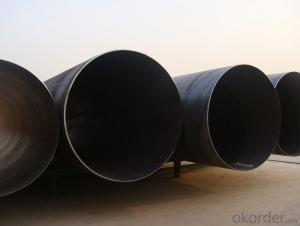LSAW SSAW CARBON STEEL PIPE ASTM API 24'' 26'' 28'' 32''
- Loading Port:
- Tianjin
- Payment Terms:
- TT OR LC
- Min Order Qty:
- 1 m.t.
- Supply Capability:
- 3000 m.t./month
OKorder Service Pledge
OKorder Financial Service
You Might Also Like
Packaging & Delivery
Packaging Detail: | Normal exporting packing,in container or bulk vessel or as per clients' request |
Delivery Detail: | 2 months after confimed contract |
Specifications
Large Diameter API 5L X70 PSL2 LSAW Steel Pipe
Grade: X42, X46, X50, X52, X60, B, C
OD: 1.5"-28"
WT: SCH10-SCH160
Large Diameter API 5L X70 PSL2 LSAW Steel Pipe
Specifications:
u Standard: API 5L
u Grade: B, C, X42, X46, X50, X52, X56, X60, X65, X70, X80
u OD: 1.5"-28"
u WT: SCH10-SCH160
u Length: 5-12m
u Ends Finish: plain end, bevel end, grooved end
u Surface Treatment: bare, black varnished, oiled finish, red color, anti-corrosion, 3PE, FBE or epoxy coating
u Technique: hot rolled or cold drawn
u Application: api 5l steel pipe for conveying oil, water, gas
u Invoicing: based on theoretical weight or actual weight
u Payment Terms: L/C at sight, T/T or Western Union
u Trade Terms: FOB, CFR, CIF
u Certification: ABS manufacturing assessment, ABS design assessment, API 5CT, API 5L, DNV manufacturer certificate, ISO9001 quality management system certificate, ISO14001 environment management system certificate, GB/T28001 occupational health and safety management system certificate, A1 class manufacturing license of special equipment certificate, CCS, GL, LR, SGS, TüV, PDE
- Q: Does the seamless steel pipe need rust removal?
- Spray (throw) shoot derusting by the high-power motor to drive the spray shot (impeller) blade rotating speed, the steel grit, steel shot, iron wire, minerals and other abrasive jet for 20# seamless steel tube surface under the action of centrifugal force (left) radiation treatment, not only can completely remove the dirt and rust, oxide, and the role of 20# seamless steel in abrasive blast and friction force, can achieve the required uniform roughness.Not only can the physical adsorption effect on the surface of the pipe be increased, but also the mechanical adhesion of the anticorrosive layer to the pipe surface can be enhanced. Therefore, spraying (throwing) shot derusting is an ideal method of rust prevention for pipeline corrosion protection. Generally speaking, shot peening (sand) derusting is mainly used in the inner surface treatment of tubes, shot blasting (sand) derusting is mainly used for the outer surface treatment of tubes.
- Q: Material of welded steel pipe
- GB/T14980-1994 (large diameter welded pipe for low pressure fluid delivery). Mainly used to transport water, sewage, gas, air, heating, steam and other low-pressure fluid and other uses. Its representative material is Q235 grade a steel.GB/T12770-1991 (stainless steel welded pipe for mechanical structure). Mainly used in machinery, automobiles, bicycles, furniture, hotels and restaurants, decorations and other mechanical parts and structures. Its representative material 0Cr13, 1Cr17, 00Cr19Ni11, 1Cr18Ni9, 0Cr18Ni11Nb and so on.
- Q: How are steel pipes used in the transportation industry?
- Steel pipes are commonly used in the transportation industry for various purposes such as the construction of pipelines, including oil and gas pipelines, water pipelines, and sewage pipelines. They are also used in the manufacturing of automotive parts, such as exhaust systems, and in the construction of infrastructure such as bridges and tunnels. Additionally, steel pipes are used in the transportation of goods through shipping containers and railway tracks.
- Q: How are steel pipes inspected for defects?
- Steel pipes are inspected for defects using various methods, including visual inspection, ultrasonic testing, magnetic particle inspection, dye penetrant testing, and radiographic examination. These techniques help identify any cracks, corrosion, or other defects in the pipes to ensure their structural integrity and prevent any potential hazards or failures.
- Q: Can steel pipes be used for desalination plants?
- Yes, steel pipes can be used for desalination plants. Steel pipes are commonly used in desalination plants to transport and distribute water, as they are durable, resistant to corrosion, and can handle high-pressure systems.
- Q: What are the different types of gaskets used with steel pipes?
- There are several types of gaskets commonly used with steel pipes, including ring type joint (RTJ) gaskets, spiral wound gaskets, and flat gaskets. RTJ gaskets are designed to create a tight seal by compressing between two flanges, while spiral wound gaskets consist of a metal winding and filler material for enhanced sealing properties. Flat gaskets are typically made from rubber or non-metallic materials and are used for lower pressure applications.
- Q: What are the different methods of pipe repair for steel pipes?
- There are several different methods of pipe repair for steel pipes, depending on the severity and location of the damage. Here are some of the most common methods: 1. Welding: This is a common method used for repairing steel pipes, especially when the damage is localized. The damaged section of the pipe is cut out, and a new piece of pipe is welded in its place. The weld is then inspected to ensure its strength and integrity. 2. Pipe wrapping: This method involves wrapping a layer of fiberglass or epoxy around the damaged section of the pipe. The wrap is applied tightly and securely to provide structural reinforcement and prevent further leakage or corrosion. 3. Pipe lining: This technique involves inserting a flexible liner into the damaged pipe. The liner is made of materials such as epoxy, PVC, or cured-in-place pipe (CIPP). Once inserted, the liner is inflated or heated to conform to the shape of the pipe, creating a new inner surface that is resistant to corrosion and leakage. 4. Slip lining: Similar to pipe lining, slip lining involves inserting a smaller diameter pipe into the damaged pipe. The smaller pipe acts as a protective sleeve, providing structural reinforcement and preventing further deterioration of the original pipe. 5. Pipe bursting: This method is used when the damage to the pipe is extensive. A new pipe is pulled through the damaged one, using a hydraulic or pneumatic system. As the new pipe is pulled through, it bursts the old pipe, creating a larger diameter pipe with minimal disruption to the surrounding area. 6. Clamp or sleeve repair: In cases where the damage is small and localized, a clamp or sleeve can be used to provide a temporary or permanent fix. The clamp or sleeve is placed over the damaged section and tightened securely to prevent leakage. It is important to note that the best method of pipe repair for steel pipes depends on various factors such as the extent of damage, accessibility, cost, and structural requirements. Consulting with a professional pipe repair specialist or engineer is recommended to determine the most suitable method for your specific situation.
- Q: Can steel pipes be used for sewage systems?
- Yes, steel pipes can be used for sewage systems. Steel pipes are commonly used in sewage systems for their durability, strength, and resistance to corrosion. They are suitable for transporting sewage and wastewater, ensuring reliable and long-lasting performance.
- Q: How are steel pipes protected against corrosion in marine environments?
- Steel pipes are protected against corrosion in marine environments through various methods, such as applying protective coatings, using sacrificial anodes, employing cathodic protection, and implementing corrosion inhibitors.
- Q: What are the different methods of insulating steel pipes?
- There exists a variety of methods for insulating steel pipes, depending on the specific needs and requirements of the application. Some commonly utilized methods include: 1. Insulation wraps: By enveloping the steel pipes with insulating materials such as fiberglass, mineral wool, or foam insulation and securing them tightly with adhesive or tape, insulation wraps offer a cost-effective and straightforward installation option favored by many. 2. Insulation coatings: Applying a layer of insulating material directly onto the surface of the steel pipe, insulation coatings made from materials like epoxy, polyurethane, or polyethylene protect against corrosion and temperature fluctuations, making them ideal for harsh environments. 3. Insulation jackets: Utilizing pre-fabricated insulation jackets designed to fit over the steel pipes, this method combines insulation materials with a weatherproof outer layer. Insulation jackets are commonly employed for outdoor or exposed pipelines, providing excellent insulation and protection against external elements. 4. Insulation foam: Injecting foam insulation into the space between the steel pipe and an outer casing, the foam expands and hardens to create a sealed and well-insulated layer. Apart from preventing heat loss or gain, foam insulation also offers remarkable soundproofing properties. 5. Insulation tapes: Specially designed insulation tapes made from PVC or rubber, possessing good insulating properties, are wrapped around smaller pipes or joints. This flexible and easy-to-apply solution is commonly employed. When selecting the appropriate method to insulate steel pipes, it is crucial to consider factors such as operating temperature, environmental conditions, and specific application requirements. Seeking advice from a professional or insulation specialist can assist in determining the most suitable insulation method for individual needs.
Send your message to us
LSAW SSAW CARBON STEEL PIPE ASTM API 24'' 26'' 28'' 32''
- Loading Port:
- Tianjin
- Payment Terms:
- TT OR LC
- Min Order Qty:
- 1 m.t.
- Supply Capability:
- 3000 m.t./month
OKorder Service Pledge
OKorder Financial Service
Similar products
Hot products
Hot Searches
Related keywords
